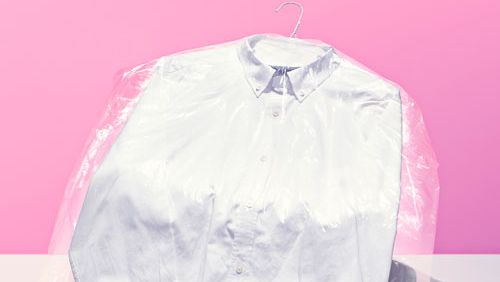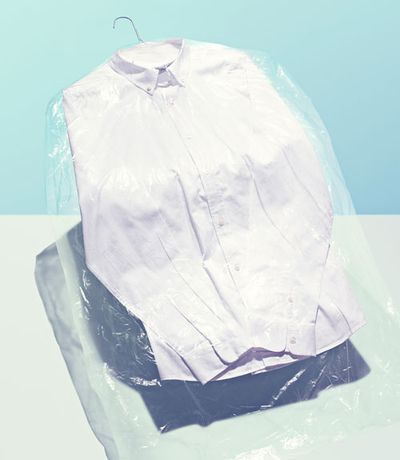Why Women Pay More
From dry cleaning to haircuts, women often pay more than men due to gender pricing. Find out why you may be paying more, but receiving less. You can drop your local representative a line demanding a federal law outlawing gender pricing at marieclaire.com/womenpaymore.

Q: Why Does this Shirt Cost More to Clean than that One?
A: Because it belongs to a woman. Over the course of your lifetime, you'll pay more than a man for everything from health insurance to haircuts, dry cleaning to deodorant. Here's how businesses get away with sex discrimination, and what you can do to stop it
THREE YEARS AGO, Janet Floyd, the cofounder of a Manhattan market research firm, spotted a neighborhood dry cleaner that offered the following deal: Launder four shirts and get the fifth laundered for free. Button-downs are a staple of Floyd's wardrobe, so she returned carrying an armload of oxfords. But when she dropped the shirts on the counter, she was told that the offer applied only to men's shirts, not "blouses." "The owner of the store insisted women's shirts didn't fit on their machines and needed to be hand-pressed," says Floyd. (The cleaner charged roughly $2 to launder a dress shirt versus $6.50 to dry-clean a blouse.) Floyd then asked if she could pay the higher price on four of her shirts and still get the fifth cleaned for free. The owner declined. "It was outrageous. They were giving this huge discount to men, and we weren't getting one," she fumes.
Sounds like blatant discrimination, right? It is, and yet it's perfectly legal. Though civil rights laws prohibit job and housing discrimination on the basis of race, gender, or sexual orientation, there's no federal law banning discrimination in the sale of goods and services. Several cities and states have adopted their own antidiscrimination statutes, but they are often vague and rife with loopholes--like the one that lets dry cleaners charge more if the garment requires "extra labor." (Many cleaners don't even launder women's shirts, forcing female customers to dry-clean everything.) While it would be unthinkable to encounter a menu of services that overtly discriminates on the basis of, say, race — imagine a salon that posted different prices for blacks and whites--it's a long-standing practice when it comes to services that target men and women. "This is a problem that has gone on for many years," explains professor John Banzhaf of the George Washington University Law School. "Even though it's well recognized, people sit back and go, 'Well, that's just the way it is.' And if you compare it with all the problems women face, it's certainly not in the top one, three, even five."
In fact, being a woman in this country has become an increasingly expensive proposition. It's not just dry cleaning and haircuts where women get socked: We pay more for home mortgages, health insurance, and cars and car repairs (even when we mind our credit, eat right and exercise, and do our homework), not to mention everyday items like deodorant and disposable razors. California, which in 1996 became the first state to ban gender pricing, found that women paid about $1,351 annually in extra costs and fees. Apply that figure to the rest of the women in the country and the total burden is staggering — roughly $151 billion in markups, more than what the federal government spent on education last year and greater than the budgets of 43 states.
Even more startling is how little outrage the issue seems to summon among women, though we lose out in nearly every transaction we make. Last year, the European Union's top court outlawed all forms of insurance-related gender pricing, a move that will have profound repercussions for any European who drives or buys into a health-insurance plan. Yet there's no movement here to change the law, no marches in Washington or sit-ins at Congress, no viral Facebook or YouTube campaigns. And without meaningful legislation that demands equality for men and women at the cash register, change will have to come one lawsuit at a time. And who goes to court over a dry-cleaning bill?
TWELVE YEARS AGO, Michael Cone, a New York City trade lawyer, was researching import tariffs at the request of a client, a shoe manufacturer. Reading through the U.S. tariff schedule — the list of fees the government imposes on goods shipped in from other nations — he was stunned: Men's sneakers were taxed at 8.5 percent, while women's sneakers were taxed at 10 percent. "I immediately thought, You can't do that! That's discrimination!" Cone recalls. After more digging, he learned that the government discriminates across the board for all sorts of garments. Sometimes men get the advantage, sometimes women. (Men's gloves, for example, are taxed at 14 percent, while women's are taxed at 12.6 percent.) Though there is no ostensible rationale for the discrepancies, the tariff codes have a history of bias — before the Civil War, cheap imported wool incurred a lower duty than finer wool so Southern slave owners could clothe their slaves cheaply.
Get exclusive access to fashion and beauty trends, hot-off-the-press celebrity news, and more.
Because women face stiffer tariffs on some of the highest-volume items shipped into the United States, Cone — who has since joined the firm FSB FisherBroyles, LLP — believes that discriminatory tariffs have hurt women more than men. "The Constitution forbids Uncle Sam from sticking his hands down your jeans to find out whether you're a man or woman for no good reason," he says. Cone is currently suing the government for discrimination. (The case is still pending.) Initially, he reached out to other clients who might join him as co-plaintiffs. He told them that if he won (a big if, to be sure), they could potentially recover millions of dollars from the government in unfair tariffs. More than 100 companies eventually signed on, including Steve Madden and Urban Outfitters. "But others wouldn't touch the case with a 10-foot pole," Cone explains. "I think one of the reasons is that they were worried it would draw more attention to gender pricing" — their gender pricing, which earns them untold millions and which inequitable tariffs alone cannot justify.
Though few retailers will cop to it, gender pricing is standard industry practice. It's especially pronounced at the drugstore, where bathroom staples like shampoo, soap, and razors marketed to women (invariably packaged in pretty pastels) routinely cost more than near-identical products for men. A recent study by researchers at the University of Central Florida examined some 200 sticks of deodorant sold at major drugstore chains and found that sticks for women cost, on average, 30 cents more per ounce than those for men, even when the only discernible difference was scent. "These companies have us convinced that men and women are so biologically different that we need completely different products, as though we are a different species," says study coauthor Megan Duesterhaus.

How do manufacturers and retailers get away with it? We let them by not asking enough questions, doing enough research, or challenging vendors who give us a raw deal. In 2006, the Consumer Federation of America reported that women were 32 percent more likely than men to get saddled with costly, high-interest subprime loans — even in cases where their credit ratings and credit histories were better than the men's. That translated into paying thousands more in interest over the life of the loan. Public advocates were quick to point to discrimination as the reason, but economists had another theory: Women tend to rely on word-of-mouth recommendations when choosing a lender rather than shopping around for the lowest rate the way men do. We also find negotiating anathema, which means that the markdowns salespeople tend to give customers who haggle — say, in an appliance showroom — typically go to men. "The idea of just giving a discount to those who ask for one puts women at a strong disadvantage since they are less inclined to ask," says Yale Law School professor Ian Ayres.
But even if you're prepared to bargain, the odds are still stacked against you. Twenty years ago, Ayres published a landmark study proving that women got hosed at car dealerships. (The study has since been twice updated, with similar results.) On average, women were offered list prices $200 higher than prices quoted to white men. (Black women fared even worse — they were quoted prices $400 higher.) Ayres argued that women who pay inflated prices are so lucrative to dealerships, and account for such a huge chunk of commissions, that dealers are willing to let savvier customers go just to court these customers. Let's say you're the rare female buyer who actually does her homework. You walk onto the car lot confident and informed, asking all the right questions. The salesman will probably still offer you a lousy deal. "That's the perversity of it: He may be willing to sacrifice your sale in order to charge higher prices to all women, just to make sure he doesn't miss any home runs," explains Ayres. "It's a search for suckers."
The health-insurance market is also rigged against women — even celery-chomping, treadmill-loving paragons of health. An estimated 95 percent of insurers practice "gender rating," resulting in hundreds of dollars in higher costs for women, according to the National Women's Law Center. For example, a fit 25-year-old woman looking to buy an individual plan can be charged up to 45 percent more than a 25-year-old man, even when her policy excludes maternity care. More infuriating: Women who don't smoke often pay higher premiums than men who do.
When it comes to group plans — the kind your company usually provides — it is illegal for an employer to set different prices for male and female employees. But if your firm employs more women than men, insurers can subvert that law by jacking up everyone's premiums. "It's a standard industry practice going back decades," says Robert Zirkelbach, spokesman for America's Health Insurance Plan, an industry trade group, of higher premiums charged to women. He says women "tend to have more health-care costs than men" and see more doctors than men of the same age. But wouldn't a healthy woman who sees her doctor regularly be cheaper to cover in the long run than a smoker who avoids the doctor for years? "That is a hypothetical I couldn't begin to weigh in on," says Zirkelbach.
There are hopeful signs that women are leveling the pricing field, albeit slowly: Thanks to user-generated rating sites like Yelp, it's never been easier to call out businesses that aren't playing by the rules. President Obama's health-care bill, slated to take effect in 2014 (presuming it survives withering challenges by Republicans), will outlaw discrimination in individual health insurance policies. And because this is an election year (435 seats in the House and 33 seats in the Senate are up for grabs), there's never been a better time to share your outrage with — and dangle your vote at — your elected officials.
Or you can do what Janet Floyd did. After she was denied the laundering deal because her "blouses" didn't qualify as shirts, she swore off the cleaners altogether, washing and ironing them herself. "I haven't dry-cleaned a shirt since 2009," she says proudly.
Marie Claire has posted e-mail addresses for every member of Congress and governor in the country at marieclaire.com/womenpaymore. Drop yours a line demanding a federal law outlawing gender pricing.
More from Marie Claire:
Latest Fashion & Trends for 2015